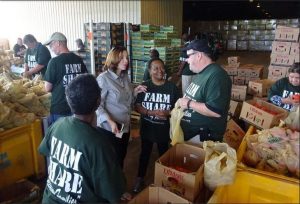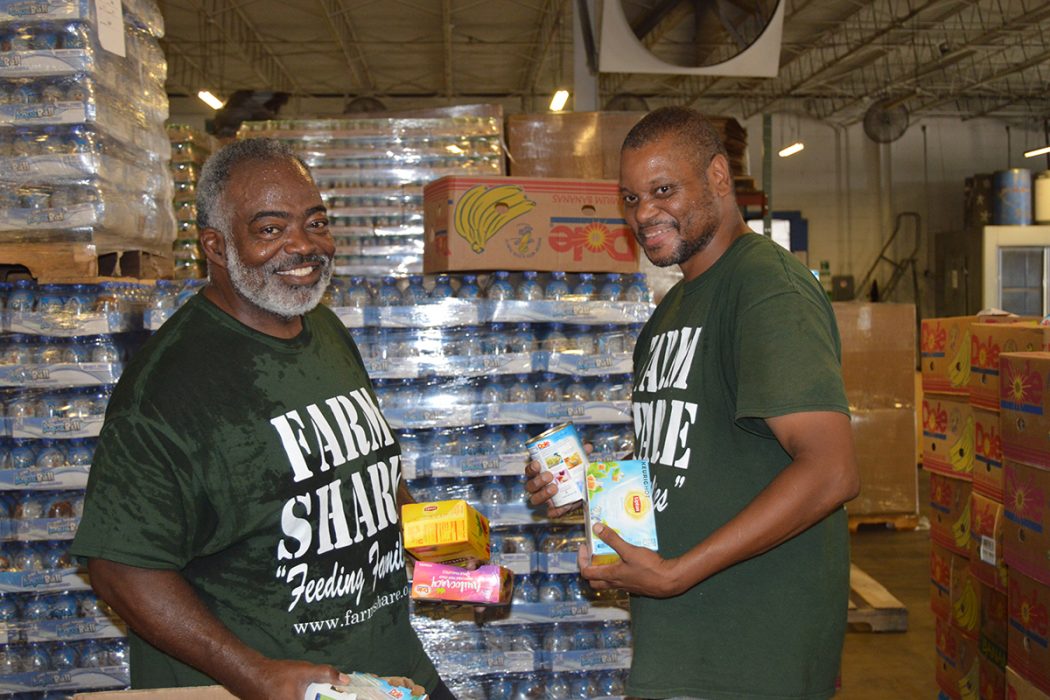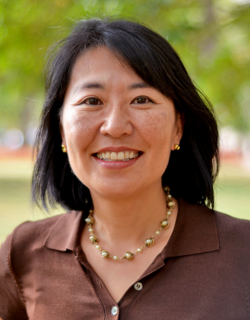Every year more than 40 percent of the food grown by farmers is either dumped in a landfill or left in the field to rot because it does not meet the size requirements of major food retailers. Because this food is perfectly healthy and nutritious, Farm Share has made its mission to distribute this produce to hungry people throughout Florida.
“A squash that is one inch too long or short is considered garbage and thrown away,” said Stephen Shelley, chief operating officer of Farm Share, adding that such substandard produce is called culls. “Farm Share provides an alternative by giving the farmer the ability to donate these culls in exchange for a tax deduction. As a result, most of the produce Farm Share receives each year comes from Florida farmers to be used to feed persons in need.”
Farm Share also receives nonperishable canned goods and other grocery products from retail stores, grocery stores, and food brokers nationwide, he said, noting the agency also operates the United States Department of Agriculture’s (USDA) The Emergency Food Assistance Program (TEFAP) in Southeast and Northeast Florida. This program provides Farm Share with canned goods and proteins, such as chicken, that are distributed in conjunction with its produce and other foods.
Founded 25 years ago, Farm Share is a statewide organization with five regional warehouse facilities that feed millions of people each year. With its first warehouse originally located in the Florida City farmers market, Farm Share was forced to move its headquarters to Homestead in 2005, after Hurricanes Katrina and Wilma combined to destroy the Florida City facility. During this time, Farm Share also acquired space at the Pompano Farmers Market and later at the Quincy Farmers Market. In 2015, Farm Share took over the food warehouse operated by Lutheran Social Services (LSS) on Jessie Street in Jacksonville, and later reacquired space at the Florida City Farmers Market.
“In 2015, LSS was at risk of going into bankruptcy and losing the USDA TEFAP contract for noncompliance,” Shelley explained. “Farm Share agreed to come in and take over the food bank and the USDA contract to make sure the region continued to be serviced.”
Since Farm Share took over two years ago, the amount of food distributed out of the Jacksonville warehouse has increased from 3.6 million pounds to 11.6 million pounds annually, with food distributed to approximately 2.3 million households or 7 million people, he said.
So far, collectively, Farm Share has distributed 51,898,761 pounds of food in 2017, with the Jacksonville warehouse providing 7,980,590 pounds of food to needy families from January to June of the same year, according to information supplied by the Jacksonville facility.

Emma Holt (middle) joins other Farm Share volunteers at the warehouse on Jessie Street in Jacksonville.
In addition, the nonprofit’s network of partner agencies has also grown from 80 to 120, with more signing up each month.
“Farm Share is increasing its donor base from both a food product and monetary perspective. Presently we service 11 main counties from our Jacksonville facility – Duval, Nassau, Baker, Union, Bradford, Putnam, St. Johns, Flagler, Levy, Alachua, and Clay,” Shelley said. Farm Share also supplies fresh produce and groceries to other counties as well.
All the dollars in Farm Share’s $6 million annual operating budget are used to recover and distribute produce and groceries. The market value of the produce and groceries received by Farm Share last year was approximately $76 million, Shelley said.
Making Farm Share unique among large food banks is its focus on healthy, nutritious food, and the fact that it acquires all its produce and groceries by donations. “We do not have to pay for any of the produce from farmers. We only pay the trucking costs associated with picking up the produce and moving it between Farm Share facilities,” he said.
“We also distribute all the food we recover free of charge to both the agencies and individuals. Most of the large food banks charge agencies a maintenance fee of 20 cents a pound for their food. Farm Share has always been free. As a result, we help make sure the most needy agencies and persons are served in every community,” he said.
Farm Share’s overall numbers have increased substantially over the last five years and attribute this growth to increased funding to operate its programming, Shelley said. However, he also said some of the increase in the amount of food distributed was probably due to the economic recession. “Farm Share does notice that the amount of people attending its Community Food Distributions increases and decreases based upon the economy and similar socioeconomic factors,” he said.
The nonprofit receives support from Publix, Walmart, and a few private donors in the way of food and cash donations, but most of its funding comes from the Florida Legislature and county governments. Because government funding can be volatile from year to year, Farm Share is always looking for monetary support from private sources so it can expand its programs.
“By focusing on increasing private fundraising efforts, Farm Share hopes to become less reliant on government funding and instead develop more long-term and stable funding sources,” he said.
Farm Share started a new Community Crime and Policing Program last year in Miami-Dade, Duval, and Alachua Counties to see if increased food distribution has an impact on reducing lawbreaking in high-crime communities.
“What we found was that in the high-crime communities where we consistently held food distribution events in conjunction with job training and health screenings, the crime rate decreased,” Shelley said.
By having law enforcement officers assist with the food distribution, Farm Share also discovered the relationship between police and sheriff’s departments with those communities has improved. In the future, Farm Share plans to expand the program statewide, he said.





